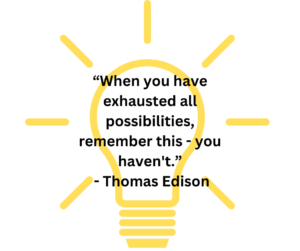In a constantly changing world, the ability to adapt is essential for overcoming obstacles. Rigidity in our thinking and an unwillingness to change course can trap us in a cycle of frustration. When faced with challenges, instead of stubbornly clinging to our initial plans, embracing adaptability allows us to pivot, explore alternative solutions, and navigate the challenges we may face. This might mean making adjustments, experimenting with different approaches, or even completely changing our course of action. Thomas Edison: When you have exhausted all possibilities, remember this – you haven't.
This statement embodies an essential truth: even in the face of seemingly overwhelming obstacles, there are always untapped possibilities, hidden paths, and unconventional solutions waiting to be discovered. The key is to embrace a mindset of relentless determination, creativity, and the willingness to explore new avenues.
The Power of Perseverance for overcoming obstacles
One of the most important lessons we can learn from this quote is the importance of perseverance. When facing challenges, it's easy to become discouraged and lose faith in ourselves. We begin to doubt our abilities, questioning whether we have what it takes to succeed. Yet, history is filled with examples of individuals who triumphed in the face of extraordinary adversity due to their unwavering perseverance.
Consider the story of Nelson Mandela, who spent 27 years in prison for his fight against apartheid but ultimately emerged as a symbol of freedom and reconciliation. Or J.K. Rowling, whose Harry Potter manuscript was rejected by numerous publishers before finding phenomenal success. These examples remind us that even when doors slam shut, perseverance can lead us to unlock new opportunities.
Shifting Your Perspective
When we feel like we've hit a dead end, it's crucial to shift our perspective. Often, the solutions we seek lie outside of our current way of thinking. By adopting a more flexible mindset and embracing new perspectives, we open ourselves up to possibilities that we might have previously overlooked.
This may involve seeking advice from mentors, collaborating with diverse groups of people, or simply stepping outside of our comfort zones to try something new. By exposing ourselves to different ways of thinking and problem-solving, we expand our horizons and increase our chances of finding innovative solutions.
Embracing Failure as a Stepping Stone
The fear of failure can be a significant obstacle preventing us from moving forward. Sometimes, we become paralyzed by the thought of making a mistake or not achieving our desired outcome. However, it's essential to reframe our understanding of failure. Instead of viewing it as a sign of defeat, we need to recognize it as a valuable learning opportunity.
Every failure offers insights into what didn't work and clues about what might work better next time. By analyzing our missteps, we can adjust our approach, refine our strategies, and move closer to our goals.
The Importance of Adaptability in overcoming obstacles
In a constantly changing world, the ability to adapt is essential for overcoming obstacles. Rigidity in our thinking and an unwillingness to change course can trap us in a cycle of frustration. When faced with challenges, instead of stubbornly clinging to our initial plans, embracing adaptability allows us to pivot, explore alternative solutions, and navigate the challenges we may face.
This might mean making adjustments, experimenting with different approaches, or even completely changing our course of action. Adaptability means we understand that there are often multiple routes to our desired destination; if one path is blocked, we find another.
The Importance of Maintaining Perspective
When things get tough, it's easy to get lost in the weeds of a problem. We hyper-focus on the hurdles and the negativity while losing sight of the big picture. During times of discouragement, remembering why we started in the first place is vital. Reconnecting with our purpose can reignite our passion and determination.
FAQ
Q: I feel completely stuck and genuinely don't see a way forward. What should I do?
A: Feeling completely blocked is normal when facing obstacles. Take a step back, even if just for a short break. Go for a walk, listen to music, or engage in an activity that relaxes you. Clearing your mind can make space for fresh ideas to emerge. Then, consider talking things through with a trusted friend, mentor, or therapist for an outside perspective.
Q: How can I stay motivated when overcoming obstacles feels so hard?
A: Focus on small wins. Break down your larger goal into smaller milestones and celebrate each achievement along the way. Remind yourself of your core purpose – why this goal is important to you. Visualize success and surround yourself with positive and supportive people who can bolster your motivation.
Q: Is it ever okay to give up on a goal?
A: There's a difference between giving up and strategic course correction. If a goal truly no longer aligns with your values or it's causing significant harm, it may be healthy to reassess. However, giving up due to temporary obstacles shortchanges your potential. Seek outside feedback before making major decisions.
Q: How do I know if I haven't tried everything yet?
A: Have you explored a wide range of sources for help? Have you sought advice from diverse mentors or people with different skill sets? If you feel stuck in a pattern, consider intentionally doing something completely out of your comfort zone to spark new ideas.


















